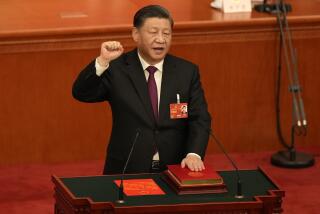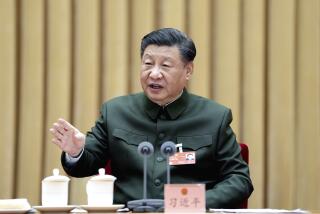Stronger Control by Beijing Urged to Help Economy : China: The party chief demands that regional authorities obey the central government.
- Share via
BEIJING — Communist Party General Secretary Jiang Zemin, in a major speech published Tuesday, declared that centralized control must be strengthened to solve China’s economic problems.
“At present, the central authorities must concentrate power and financial and material resources in the optimum way (and) must stress the importance of the state plan; only thus can we stabilize the whole economic situation,” Jiang said. The speech, delivered Nov. 9 at a plenary session of the party’s Central Committee, was released Tuesday by the official New China News Agency.
Jiang delivered the speech immediately after being named by the 175-member Central Committee to head the party’s military commission, replacing senior leader Deng Xiaoping in that powerful post. Deng, 85, who remains the dominant figure in Chinese politics, has made it clear that he wants Jiang to be his successor as paramount leader.
Jiang, 63, became party general secretary in late June, replacing the reformist Zhao Ziyang, who was ousted for opposing the use of martial-law troops to suppress pro-democracy student protests.
Jiang’s speech, although representing collective views of the top leadership, also marked an opportunity for him to build his own authority as leader both of the party and army. He sought to do this with a mixture of modesty and toughness.
“I said at the previous plenary session (in late June) that I was not fully prepared when I was elected general secretary of the Central Committee,” Jiang said. “This time, I am not fully prepared either. I have no experience in military work, and I feel my abilities fall far short of what the position demands. But, since the party has assigned the work to me, I must make every effort to learn about military affairs and familiarize myself as soon as possible with the armed forces and carry out my duty conscientiously and actively.”
Jiang--whose ability to impose his will on top army leaders is questioned by many observers--went on to stress that the armed forces must obey the Communist Party, declaring: “Our army is the people’s army led by the party.”
Calling Deng by his given name in a familiar and affectionate show of respect, Jiang also made reference to the continued political importance of the senior leader. Deng’s support is the key factor boosting Jiang’s power.
“The health and longevity of Comrade Xiaoping is of great significance to the smooth development of the work of the party and the state,” Jiang said.
In tougher language, he demanded “the strengthening of party discipline.”
“It is our party’s consistent rule that individual party members are subordinate to the party organization, the minority is subordinate to the majority, the lower party organizations are subordinate to the higher party organizations and all the party members and organizations are subordinate to the Central Committee,” he said. “This is the basic organizational discipline that all party members must observe.”
Jiang demanded that regional authorities obey central government orders aimed at stabilizing China’s economic situation. China is in the midst of an economic austerity program aimed at controlling inflation by cooling down what until recently was an overheated economy.
“When anything has been decided by the party Central Committee and the State Council, all localities and departments should do their best to make it a success,” Jiang said. “They can neither fall short of the requirements nor simply go their own way.”
Jiang offered few specifics on economic policy but stressed that China requires steady, balanced development “without violent ups and downs.”
More to Read
Sign up for Essential California
The most important California stories and recommendations in your inbox every morning.
You may occasionally receive promotional content from the Los Angeles Times.













